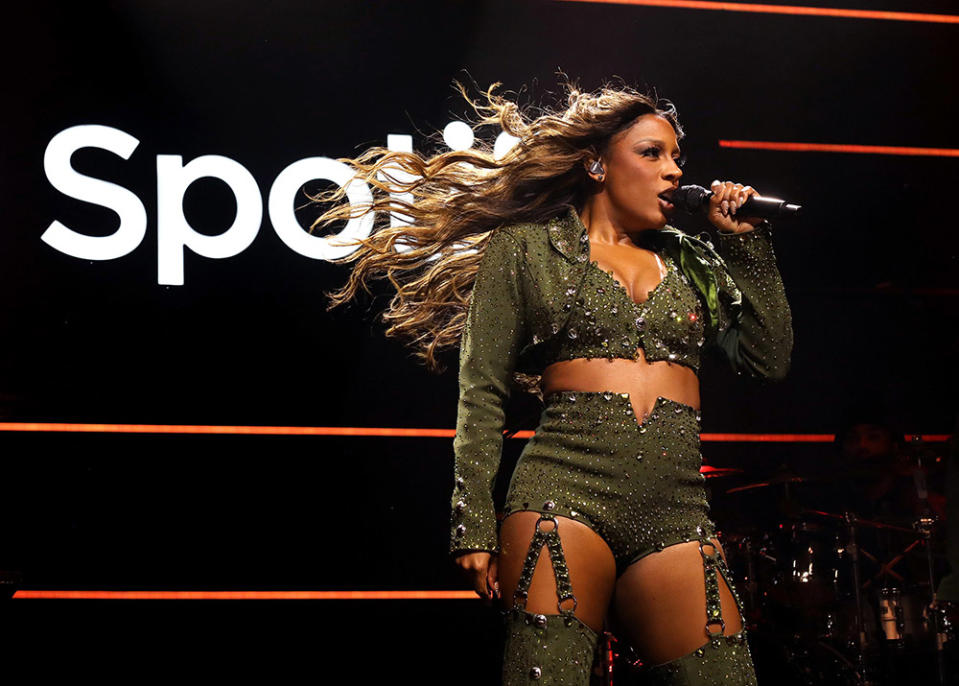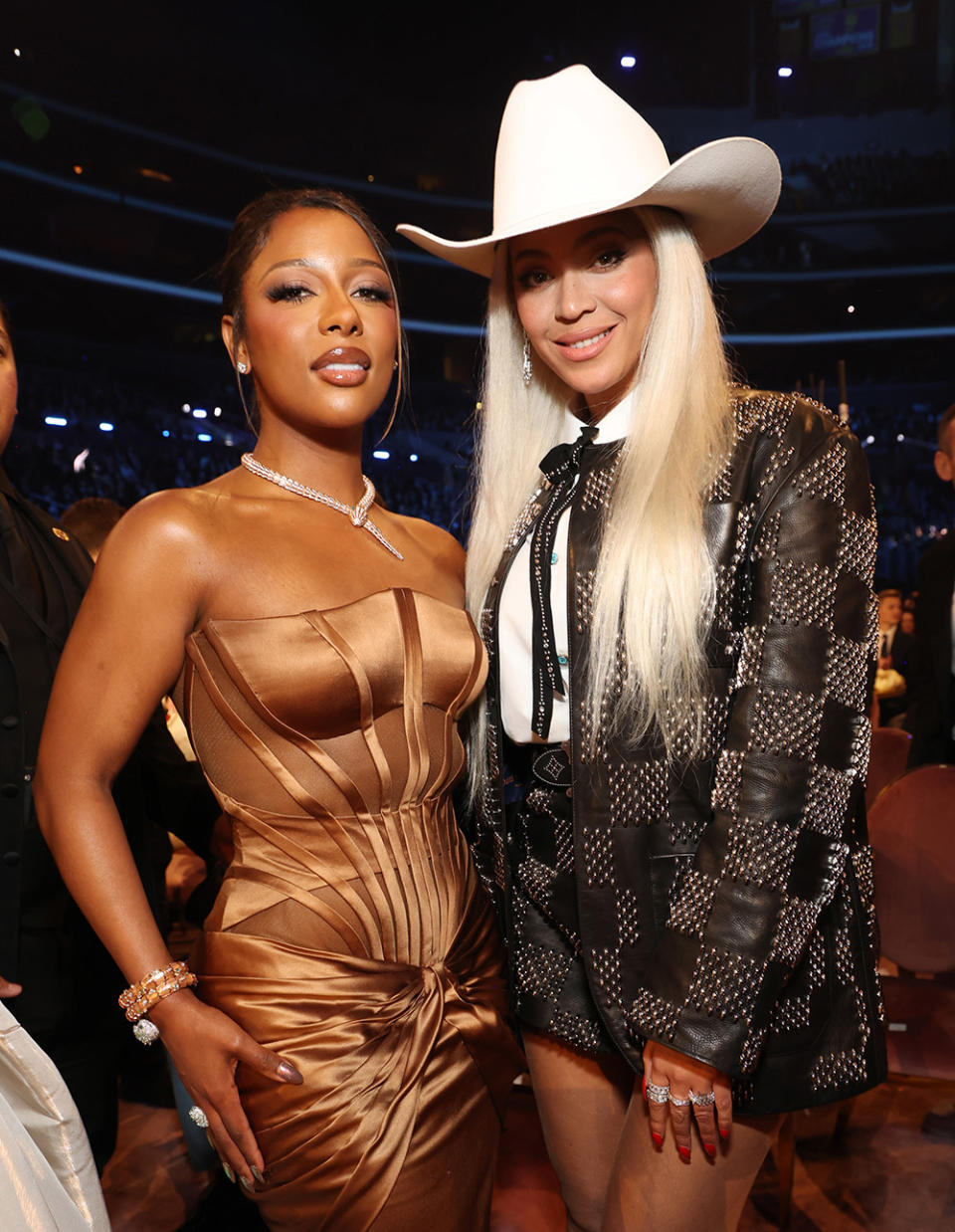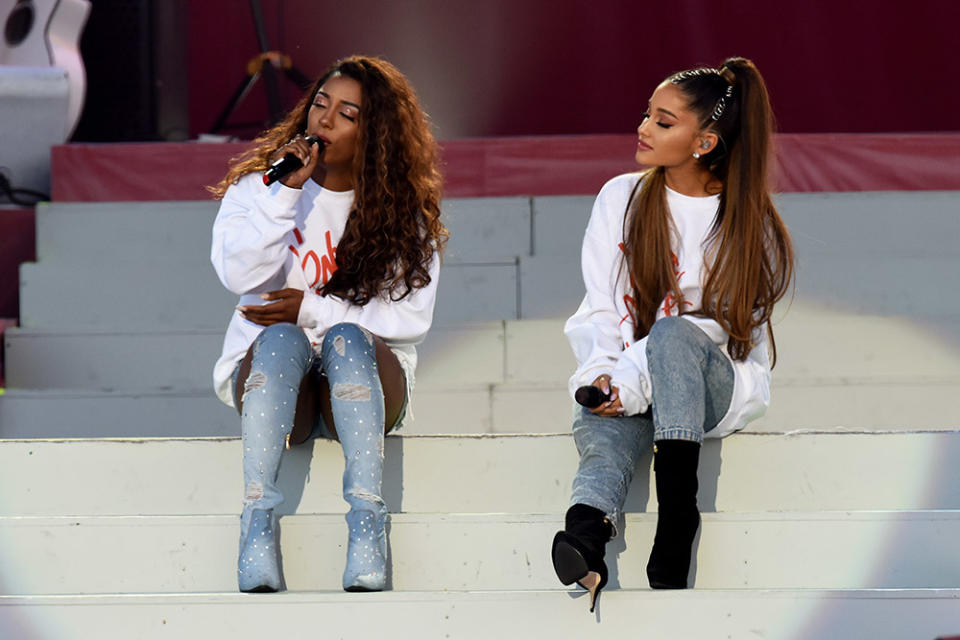Victoria Monét Reflects on Historic Win as First Black Woman to Earn Best Engineered Album Grammy
- Oops!Something went wrong.Please try again later.
- Oops!Something went wrong.Please try again later.

While much of the focus of Victoria Monét’s triple-Grammy haul was on her best new artist win, another trophy represents a historic victory that could help break down more barriers for all women in the music industry — her win for best engineered album.
The white-hot singer-songwriter is the first Black woman to win the award in the show’s 66-year history, since she co-engineered her major-label debut album, Jaguar II.
More from The Hollywood Reporter
She is the fourth woman to take home the coveted Grammy, following previous wins by Imogen Heap, Trina Shoemaker and Emily Lazar. When Monét — who writes and produces her music and has crafted hits for Ariana Grande, Blackpink, Chloe x Halle and Chris Brown — speaks to THR a few weeks after that magical night to reflect on the groundbreaking milestone, she says, “It’s a beautiful thing.”
But she also adds that “it says a lot” about the industry. Instead of questioning the past, she’d like to look forward. “[I’m] seeing more and more female engineers, more female Black engineers, more even starting as little as children. There’s a program called Girls Make Beats, and they teach little girls how to engineer; they teach them how to make beats and use certain beat programs, and then they go out into the public and do performances and seminars and stuff,” Monét explains. “I’m looking forward to seeing more of this, but it is telling about where we are in the process.”
Women make up less than 3 percent of engineers in the music industry, according to a recent USC Annenberg Inclusion Initiative study. More and more gain recognition over the years, and several female engineers were nominated for album of the year at the Grammys, including Laura Sisk, Catherine Marks, Sarah Tudzin, Jayda Love and Yáng Tan. But the industry still has a major problem.

Monét — who also won the Grammy for best R&B album — shared her engineering award with John Kercy, Kyle Mann, Patrizio “Teezio” Pigliapoco, Neal Pogue, Todd Robinson and Colin Leonard. The 34-year-old singer-songwriter-dancer reveals how she added the producer and engineer titles to her résumé and recalls receiving flowers from Beyoncé.
Did you always produce and engineer when you recorded music in the studio?
I think I’ve been a producer for longer than I knew I was a producer. I didn’t know before that the definition didn’t have to be applied to actually playing an instrument or pressing any particular button. Sometimes the way Quincy Jones produces, he doesn’t touch a thing, he just orchestrates and puts together what he feels is necessary. So for as long as I can remember, when I’m involved in something, I’ve been kind of producing it — whether it be a dance performance in high school, I’m like, “How about we fade the music here, put this song with this song?” and moving things around. So when I got into the studio space, it was natural for me to voice my opinions about the direction I felt the music should go.
And engineering?
I was introduced to that through a relationship. I was dating someone for six years who was a producer, and we used to do all of our music together and lived together. Every moment at our house was music. I’d have a lot of ideas at random times. He was like, “You need to record yourself.” I was like, “OK, just show me. I’ll make sure I can record it.” I pulled the mic up to Pro Tools and started recording my audio and editing and trying to mix it and balance it out. Before that, it was GarageBand, trying to record from my laptop and figure out all of those technicalities.
Does it feel good knowing you can jump in to finish a song because you wear so many hats?
It definitely is empowering to know what’s going on. I’ve had times in the studio where an engineer wasn’t aware that I knew Pro Tools. They say they can’t do something, and then I’ll just jump in, “This is like this and then like this.” I relate a lot to the scene in Renaissance when Beyoncé was fighting for her vision and explained the hurdles she faces as a Black woman. She still has to prove herself and be heard, even with the authority she has more than earned. Knowing this allows me not to be bullshitted as much.

What was it like meeting her at the Grammys?
Insane, crazy. There was a point where she looked over at me and mouthed my name to say hi, and I couldn’t believe it, so I spent the time that she was looking at me being shocked instead of saying hello back. And my manager was like, “You should go say hi to her.” I said, “Absolutely not. Everyone’s trying to get to her right now. She probably needs space.” I went and said hello. We spoke a bit, and then [she] sent me flowers. I’m like, “You kind woman, are you trying to take me out?” Because I’m going to pass out. Go easy on me.
Your historic win is opening doors for other women. Who are some of the creators you feel opened doors for you?
Imogen Heap. [She] is kind of self-contained and she’ll go in and record herself, and from start to finish has that ability. I think I’ve really been inspired by LaShawn Daniels as an engineer and vocal producer, so I know a lot more about how I want things to sound when they’re layered and panning vocals and certain things.
But as far as iconic female engineers, I want there to be so many more. I know there’s so many that exist, but I think because of gender and judgment, people tend to respect them less for some reason. I think when you go in and you see a female engineer sitting there, people have said, “Oh, where’s the engineer?” And they’re like, “Right here.” [It’s about] seeing it more and making it normalized and providing the space to give opportunities to the females, especially Black female engineers.

When I interviewed you in 2020, it was the first time you were competing at the Grammys, and it was for your songwriting and production work with Ariana Grande and Chloe x Halle, and you said you wanted to win 16 Grammys and mirror the greats like Beyoncé. How does it feel to know you’re inching toward that goal?
It’s honestly really, really magical. Because there’s some things that I write down that I want to accomplish that I kind of, not forget about, but it’s not like I’m saying them in the mirror every day. But one of my team members sent me this list that we made in 2021. We went to Palm Springs and I did a little presentation for my team and I wrote my goals for Jaguar and made another binder, and a lot of those goals came to fruition.
I believe in the power of manifestation, writing things down, visualization. I think writing them down is, specifically, a huge key to it. But it’s really, really amazing. Now I’m trying to think of the next set of things and not think [that] anything is too big because at this point. So many big things have happened that maybe people would’ve thought were too big for me.
Do you feel like your life has changed since you’ve won three Grammys?
To be honest, people are treating me a little bit different. (Laughs.) I’m not going to lie. There’s been some change in energy, which is cool. I’m going to take it, but for the most part, I’m just really trying to focus, keep my head down, keep working and take advantage of all the opportunities that are coming now.
Your song “On My Mama” is still charting …
It went platinum today! I’m so excited. It’s my first platinum record.
You wrote the song while battling postpartum?
Yes. It was the first song I wrote after having Hazel that I enjoyed. I had just done a verse and a pre-hook and the hook. There was no second verse. Then I did the second verse probably a year later. I was trying to look for a feature for it and ended up just doing it myself. So you kind of get two versions. The very first verse and hook was done when I was a little bit more depressed and needed to hear the hook words, and then by the second verse, I actually felt that way. So it’s like you get two stages of postpartum in the same song unknowingly. It became a really great song for affirmations for me, but also made me want to dance. So the combination of the two was really helpful.
Do you still plan to write songs for other artists?
I’m definitely open to writing for other people, but it’s really hard to find the time at this point. For example, my next six or seven months are pretty mapped out, so depending on when people are looking for songs and need the time, it’s hard to kind of fit those things in. I do feel like my artist career is my priority for now, and I always can return to writing in between my albums. I’m currently working on my next [album]; unless it’s a song that I’m featuring with another artist on, it’s not likely — unless it’s one of my favorite, favorite, favorite people.
An abbreviated version of this story first appeared in the March 14 issue of The Hollywood Reporter magazine. Click here to subscribe.
Best of The Hollywood Reporter

